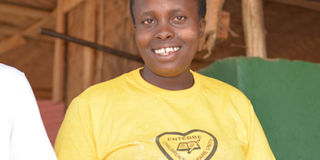Not letting disability to put her down

Lucy Nalule makes dough out of flour from which she makes pizzas mandazi, and other products. PHOTO BY BEATRICE NAKIBUUKA.
What you need to know:
Lucy Nalule had a hopeless and difficult childhood life. However, she has grown into a useful woman who can bake pizzas, mandazi and other products from which she earns money for self- sustenance.
Lucy Nalule, 20, speaks with a shaky voice that can easily pass for a murmur.
She was diagnosed with Down syndrome, an abnormality that slows the victim’s ability to learn and speak.
At 18 years, Nalule, who can speak English, Luganda and knows bits of sign language was still in Primary Four at Entebbe Children’s Welfare School and had to drop out because of the low ability to grasp what was being taught in class.
Her mother, Maureen Nakato, a resident of Nakiwogo, in Entebbe Municipality, Wakiso District had given up on her but her hope was restored by EmbraceKulture, an organisation that helps children with intellectual and development disabilities.
“All she would do was fetch water,” recalls Nakato, a single mother of two, adding that some men took advantage of her condition to sexually abuse her, which resulted in a pregnancy that she delivered in November last year but the baby died days after birth perhaps due to lack of sufficient care.
Nalule’s spirit, according to Stephen Kabenge, the community outreach coordinator of EmbranceKulture, has been uplifted because she has been taught vocational skills that have made her a useful person in society.
“We had to secure her future into a self-reliant and responsible person despite her disability,” he says.
Disability in Africa is referred to as a curse and victims are more often at the risk of being abused.
The abuse is exacerbated by stigma directed at disabled people right from school, home and in different societies.
Therefore, EmbraceKulture, through the Oliva Project programme believes that disabled children can be taught vocational skills such as baking and cookery, making crafts and tailoring that can make them self-sustaining and useful citizens.
Through this programme, according to progress reports, Nalule is able to make pizzas and mandazi with a view of making her own restaurant through which she can get an income.
“We shall continue monitoring her even after she has mastered cookery where she has immense interest,” Kabenge says.
While policy calls for inclusive education, children with disabilities have struggled due to lack of facilitates, improper or non-existent teacher training, and overcrowded classrooms.
“We are currently working with the Entebbe Children’s Welfare School and the St Ursula Special School. We work with these schools to develop a complete approach to education including primary education, vocational training and outreach,” says Christa Preston, the executive director of EmbraceKulture.
The school is government-funded under the UPE programme and currently employs nine teachers, including the head teacher, three of whom have training in special needs education. The school runs on a normal school enrolment that covers Primary One to Seven.
According to Tom Alimaa, a chef and trainer at Entebbe Welfare School, Nalule has the enthusiasm to work, she is responsible and a good time manager.
“She is easily diverted when someone annoys her but she calms down quickly. She loves teamwork and mobilises others during lessons. She is focused and learns quickly,” he says.
DATA
About Down syndrome
Down syndrome is a congenital disability which slows down physical and mental development.
It is caused by an extra genetic material known as a chromosome. Chromosomes determine the colour of our eyes and hair, according to Harriet Ajilong, a paediatrician at International Hospital Kampala.
“A normal person has 23 chromosomes but those with Down’s syndrome have 24. The condition happens at fertilisation and the extra chromosome can be carried in either the sperm or the egg,” he says.
Mothers are at a greater risk of giving birth to babies with Down syndrome when they give birth in their late 30s, couples that have a relative with Down syndrome are also likely to have one.
“Children with Down syndrome are unique and the characteristics of one child may differ from those of another. They include: slanting eyes, a small mouth that makes the tongue appear large, low set ears, a floppy neck, poor muscle tone, cardiac abnormalities, delays to sit, talk or walk,” Ajilong remarks.
Each child with Down syndrome is unique and will differ in appearance, behaviour and ability. Some are more severely affected while others may be mildly affected.
“There are no particular statistics,” according to Ajilong, “Because most parents confine their children in the houses or keep them with their grandparents when they find out they have such symptoms so it is hard to compile numerical data.”
A number of non-governmental organisations such as Down’s Syndrome Association of Uganda, Angels’ Centre for Children with Special Needs, Entebbe Children’s Welfare School and EmbraceKulture, take special care about children with down syndrome.




